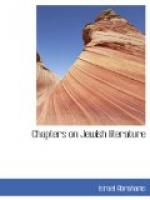Among the distinctions of Akiba’s school must be named the first literal translation of the Bible into Greek. This work was done towards the close of the second century by Aquila, a proselyte, who was inspired by Akiba’s teaching. Aquila’s version was inferior to the Alexandrian Greek version, called the Septuagint, in graces of style, but was superior in accuracy. Aquila followed the Hebrew text word by word. This translator is identical with Onkelos, to whom in later centuries the Aramaic translation (Targum Onkelos) of the Pentateuch was ascribed. Aramaic versions of the Bible were made at a very early period, and the Targum Onkelos may contain ancient elements, but in its present form it is not earlier than the fifth century.
Meir, whom we take as representative of the third generation of Tannaim, was filled with the widest sympathies. In his conception of truth, everything that men can know belonged to the Torah. Not that the Torah superseded or absorbed all other knowledge, but that the Torah needed, for its right study, all the aids which science and secular information could supply. In this way Jewish literature was to some extent saved from the danger of becoming a merely religious exercise, and in later centuries, when the mass of Jews were disposed to despise and even discourage scientific and philosophical culture, a minority was always prepared to resist this tendency and, on the ground of the views of some of the Tannaim like Meir, claimed the right to study what we should now term secular sciences. The width of Meir’s sympathies may be seen in his tolerant conduct towards his friend Elisha, the son of Abuya. When the latter forsook Judaism, Meir remained true to Elisha. He devoted himself to the effort to win back his old friend, and, though he failed, he never ceased to love him. Again, Meir was famed for his knowledge of fables, in antiquity a branch of the wisdom of all the Eastern world. Meir’s large-mindedness was matched by his large-heartedness, and in his wife Beruriah he possessed a companion whose tender sympathies and fine toleration matched his own.




